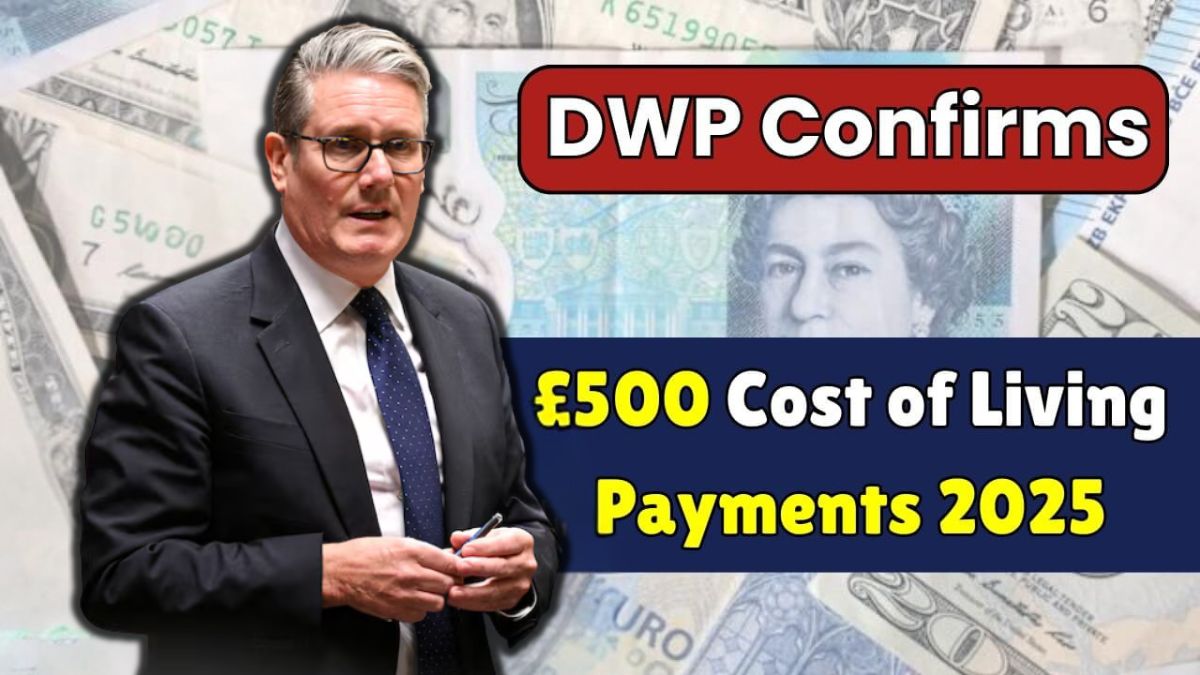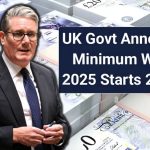The Department for Work and Pensions (DWP) has officially announced a £500 one-off cost-of-living payment set to roll out in early 2025, bringing financial relief to an estimated four million low-income households across the United Kingdom.
The payment, revealed during the Autumn Budget briefing, reinforces the government’s ongoing commitment to supporting vulnerable citizens amid continuing economic pressures, high energy costs, and persistent inflation. The measure is expected to cost the Treasury over £2 billion, marking one of the largest direct household-support initiatives of the year.
Purpose of the £500 Payment
The DWP describes the new support as part of its broader anti-poverty and cost-of-living agenda, designed to ease household financial strain while stimulating short-term consumer spending.
Policy Goals
- Relieve financial pressure from soaring food and energy costs.
- Stabilise household budgets for families and pensioners on fixed incomes.
- Reduce reliance on borrowing or payday loans among low-income households.
According to government analysts, the measure could inject nearly £2 billion back into the economy, providing both social support and local-business stimulus during a challenging fiscal period.
Understanding the £500 DWP Payment 2025
The £500 payment will be non-taxable and distributed automatically to eligible claimants through existing benefit systems.
This ensures direct delivery without any need for new applications or forms, reducing delays and limiting fraud risk.
The initiative mirrors earlier cost-of-living support from 2022 and 2023, though with updated eligibility thresholds to reach a broader group of struggling households — including working-age claimants, pensioners, and people with disabilities.
Who Will Qualify for the £500 DWP Payment
Eligibility for the £500 payment will depend on recipients being entitled to at least one means-tested benefit during a qualifying date expected to be confirmed in February 2025.
Eligible Benefits
- Universal Credit (income-based)
- Income Support
- Income-based Jobseeker’s Allowance (JSA)
- Income-related Employment and Support Allowance (ESA)
- Pension Credit
- Working Tax Credit and Child Tax Credit
Importantly, individuals receiving both DWP and HMRC benefits will only receive one £500 payment per household, avoiding duplication.
Payment Schedule and How It Will Be Delivered
Payments are expected to begin from April 2025, aligning with the start of the new fiscal year. Funds will be transferred directly into recipients’ bank accounts, using the same payment channels as their regular benefit deposits.
| Phase | Eligible Group | Estimated Payment Date | Issuing Body |
|---|---|---|---|
| Phase 1 | Universal Credit & Pension Credit | April 2025 | DWP |
| Phase 2 | Income-based JSA, ESA, Income Support | April – May 2025 | DWP |
| Phase 3 | Working & Child Tax Credits | May 2025 | HMRC |
The payment reference will appear in bank statements under the usual “DWP Payment” label.
Economic Context: Why the Support Was Needed
The UK economy continues to face slow recovery from the cost-of-living crisis.
Although inflation has eased, consumer prices remain nearly 4% higher year-on-year, with essentials like groceries, heating, and transport still outpacing wage growth.
For many on fixed incomes — particularly pensioners and disabled individuals — the squeeze on disposable income remains severe.
The £500 DWP payment is therefore both an economic stabiliser and a social lifeline, helping households stay afloat while supporting wider consumer confidence.
Connection to Other Benefit Increases
The £500 announcement coincides with several complementary welfare measures introduced for 2025:
- Universal Credit and Pension Credit will rise by 3.9%, in line with inflation.
- The Winter Fuel Payment remains in place for eligible pensioners.
- The Energy Price Guarantee has been extended through March 2026.
Together, these adjustments aim to preserve income stability and prevent a repeat of the 2023-2024 winter hardship faced by many families.
Regional Impact Across the UK
The DWP’s regional projections show uneven distribution of the £500 payment, reflecting varying benefit-dependency rates.
| Region | Estimated Recipients | Projected Disbursement (£ million) |
|---|---|---|
| London | 600,000 | £300 |
| North West | 550,000 | £275 |
| West Midlands | 480,000 | £240 |
| Yorkshire & Humber | 460,000 | £230 |
| Scotland | 400,000 | £200 |
| South East | 350,000 | £175 |
| Wales | 280,000 | £140 |
| Northern Ireland | 170,000 | £85 |
| Other Regions Combined | 710,000 | £355 |
The data highlights regional income disparities, with northern and metropolitan areas receiving the largest share due to higher Universal Credit uptake.
How to Check Eligibility Step-by-Step
Although no application is required, claimants can confirm their eligibility through these simple steps:
- Log in to your online benefits account (Universal Credit, ESA, or Pension Credit).
- Check your benefit history for payments received during the qualifying period (expected February 2025).
- Watch for DWP correspondence confirming automatic eligibility.
- Ensure your bank details and contact information are up to date.
The DWP will also run an official awareness campaign in spring 2025 to inform all eligible claimants.
Comparison with Previous Cost-of-Living Schemes
| Scheme | Year | Payment Amount | Eligibility Base | Purpose |
|---|---|---|---|---|
| Cost-of-Living Payment | 2022 | £650 (split) | Universal Credit, Pension Credit | Inflation relief |
| Disability Support Payment | 2023 | £150 | Disability Benefits | Additional care aid |
| Pensioner Payment | 2023 | £300 | Winter Fuel Top-Up | Energy support |
| New DWP Payment | 2025 | £500 | Means-tested benefits | Broad cost-of-living aid |
The 2025 payment consolidates these prior supports into a single streamlined benefit, simplifying delivery and ensuring faster relief.
Protecting Against Scams and Misinformation
The DWP warns the public to be cautious of fraudulent texts, emails, or calls offering early access to the £500 payment.
Officials stress that no application or verification is required — all payments will be automatic.
Citizens should only trust information released via the official GOV.UK website or verified DWP channels.
Public and Political Reaction
Public sentiment toward the announcement has been largely positive, especially among working-class families and pensioners.
- Age UK and Citizens Advice welcomed the move as “practical and timely relief.”
- Economists view the policy as a short-term stabiliser, though some have urged the government to pair it with long-term energy and wage reforms.
- Opposition parties have called for a permanent uplift to Universal Credit to protect against future cost shocks.
Despite mixed political views, the measure demonstrates the government’s intent to prioritise financial resilience among the UK’s most vulnerable groups.
Preparing for the £500 Payment: What Claimants Should Do
To ensure smooth delivery of the payment, households are encouraged to:
- Keep all official DWP correspondence.
- Update banking details before March 2025.
- Avoid responding to unverified messages or social-media claims.
- Monitor GOV.UK or official DWP posts for confirmed payment windows.
Proactive updates now will help prevent missed or delayed payments once rollout begins in April 2025.
FAQs
Q1. What is the £500 DWP payment for 2025?
It’s a one-off, tax-free cost-of-living payment aimed at helping low-income households manage inflation and rising living costs in 2025.
Q2. Who qualifies for the £500 payment?
Eligibility includes recipients of Universal Credit, Pension Credit, Income Support, ESA, JSA, and Tax Credits during the government’s qualifying period (to be set in February 2025).
Q3. When will the payments be made?
Payments will begin from April 2025, rolling out in phases through May depending on benefit type.
Q4. Do I need to apply for the £500 payment?
No application is required. Payments will be made automatically to qualifying claimants’ registered bank accounts.
Q5. How can I avoid scams related to this payment?
Only trust updates from GOV.UK or the official DWP website. The department will never ask for personal or bank details via text, email, or phone.










